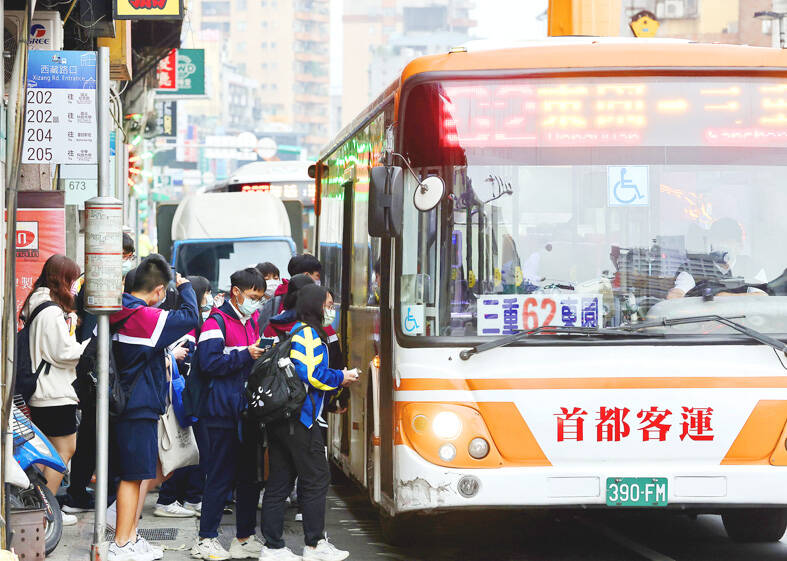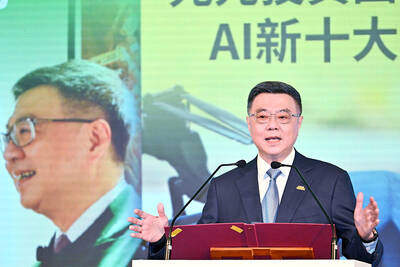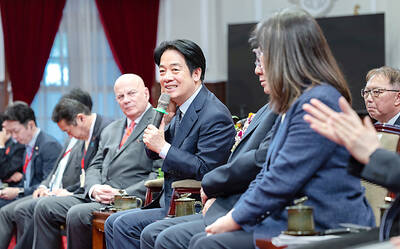Masks would no longer be required on public transportation from April 17, pending unforeseen circumstances, although the mandate would remain for hospitals and other medical facilities, the Central Epidemic Command Center (CECC) said yesterday.
The nation has met the criteria to further relax COVID-19 restrictions, the center said at a weekly news conference.
Nearly 45 percent of the population has officially reported a COVID-19 infection, although the unofficial infection rate is likely to have exceeded 70 percent, the CECC said.

Photo: CNA
More than half of people aged 65 or older have received four doses of a COVID-19 vaccine, it added.
As of yesterday, those who have been isolated in hospital quarantine for COVID-19 can be released if no fever is present and symptoms are improving, the center said, adding that a negative polymerase chain reaction (PCR) test result is not required, and 10 days of self-health management is recommended.
People who are hospitalized for other reasons must still comply with a hospital’s COVID-19 protocols upon being released from quarantine, it added.
PCR tests are not recommended for hospital or emergency room admissions if the symptoms are unrelated to COVID-19, the CECC said.
Also withdrawn from the center’s recommendations are discretionary weekly testing of people who have been admitted to a hospital for more than three days, and of presurgery patients and their companions, it said.
Patients that need additional care, including children aged up to 12, people aged 65 or older, the mentally or physically impaired, and other special-needs patients, would be allowed two companions during their stay at hospitals, it said.
However, still in effect is a restriction that no more than one person accompany a hospitalized person, while those who are visiting a patient are requested to take a rapid test at home before going to the hospital, it said.
Exemptions are in effect for family members who need to be briefed on a patient’s condition or to visit the terminally ill, the CECC said.
Separately, the application process for prospective Chinese visitors has been simplified, the Mainland Affairs Council (MAC) said on Thursday.
Chinese wishing to visit Taiwan to seek medical services, visit relatives or conduct business must submit applications to the relevant government agencies, although final approval from the CECC is no longer required, MAC Deputy Minister Jan Jyh-horng (詹志宏) told a news conference.
Additional reporting by CNA

Two US House of Representatives committees yesterday condemned China’s attempt to orchestrate a crash involving Vice President Hsiao Bi-khim’s (蕭美琴) car when she visited the Czech Republic last year as vice president-elect. Czech local media in March last year reported that a Chinese diplomat had run a red light while following Hsiao’s car from the airport, and Czech intelligence last week told local media that Chinese diplomats and agents had also planned to stage a demonstrative car collision. Hsiao on Saturday shared a Reuters news report on the incident through her account on social media platform X and wrote: “I

STILL ON THE TABLE: The government is not precluding advanced nuclear power generation if it is proven safer and the nuclear waste issue is solved, the premier said Taiwan is willing to be in step with the world by considering new methods of nuclear energy generation and to discuss alternative approaches to provide more stable power generation and help support industries, Premier Cho Jung-tai (卓榮泰) said yesterday. The government would continue to develop diverse and green energy solutions, which include considering advances in nuclear energy generation, he added. Cho’s remarks echoed President William Lai’s (賴清德) comments in an interview last month, saying the government is not precluding “advanced and newer nuclear power generation” if it is proven to be safer and the issue of nuclear waste is resolved. Lai’s comment had

‘BUILDING PARTNERSHIPS’: The US military’s aim is to continue to make any potential Chinese invasion more difficult than it already is, US General Ronald Clark said The likelihood of China invading Taiwan without contest is “very, very small” because the Taiwan Strait is under constant surveillance by multiple countries, a US general has said. General Ronald Clark, commanding officer of US Army Pacific (USARPAC), the US Army’s largest service component command, made the remarks during a dialogue hosted on Friday by Washington-based think tank the Center for Strategic and International Studies. Asked by the event host what the Chinese military has learned from its US counterpart over the years, Clark said that the first lesson is that the skill and will of US service members are “unmatched.” The second

STANDING TOGETHER: Amid China’s increasingly aggressive activities, nations must join forces in detecting and dealing with incursions, a Taiwanese official said Two senior Philippine officials and one former official yesterday attended the Taiwan International Ocean Forum in Taipei, the first high-level visit since the Philippines in April lifted a ban on such travel to Taiwan. The Ocean Affairs Council hosted the two-day event at the National Taiwan University Hospital International Convention Center. Philippine Navy spokesman Rear Admiral Roy Vincent Trinidad, Coast Guard spokesman Grand Commodore Jay Tarriela and former Philippine Presidential Communications Office assistant secretary Michel del Rosario participated in the forum. More than 100 officials, experts and entrepreneurs from 15 nations participated in the forum, which included discussions on countering China’s hybrid warfare